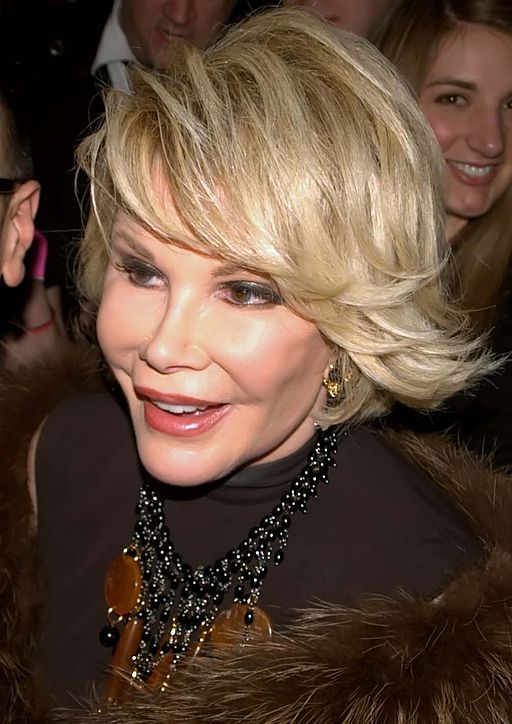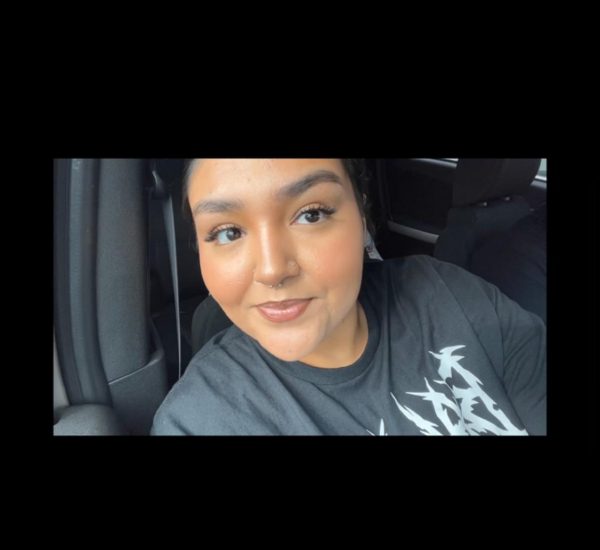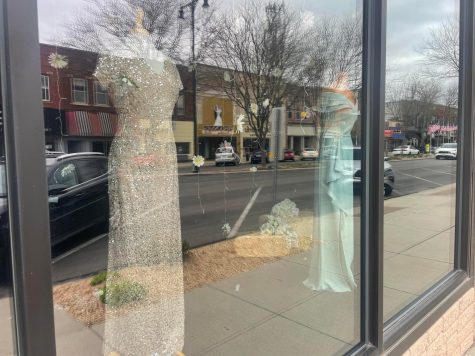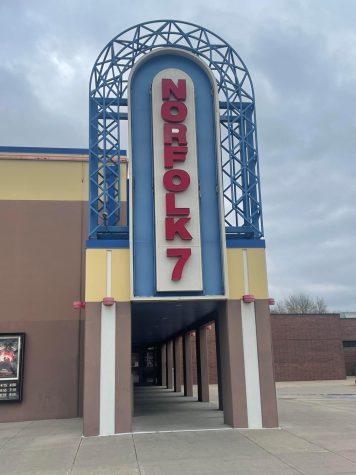Melissa Without Joan: A Daughter Deals With Loss The Rivers Way
July 22, 2015
By Amy Kaufman
Joan Rivers was about to die, and everybody needed her daughter, Melissa, to fix it. To magically bring her out of a medically induced coma. Keep her lucrative businesses afloat. Ease the pain of losing comedy’s sassy surrogate grandmother.
So Melissa went into producer mode. From her mother’s bedside, she got on the phone with Joan’s agents, attorneys and business managers to come up with a three-pronged strategy.
A. Joan wakes up and says, “What time is hair and makeup?”
B. She wakes up and needs time to recover.
C. She doesn’t wake up.
“I don’t want it to sound callous,” she says. “But if the president gets shot, the government doesn’t stop. My mother’s biggest concern was that people spent money on tickets and for babysitters and to get their hair done to see her. Your obligation is to take care of the people who spent the money. She would have been horrified if that didn’t happen.”
It wasn’t supposed to happen this way. Yes, Joan was 81. But she was about to embark on a European comedy tour. She had episodes of E’s “Fashion Police” to film, a new book to promote, bumblebee pins to hawk on QVC.
“All of these vendors were calling me hysterically upset about my mom’s condition,” Melissa recalls. “But also, like: ‘Do we continue making 50,000 bee pins? Because we’re about to start the run.’”
She could have told them to get lost and retreated into her grief. But that’s not the Rivers way. When Melissa’s father, Edgar Rosenberg, committed suicide in 1987, Joan insisted the family not wallow. The mother and daughter even starred in a made-for-television movie about his death on NBC seven years later.
That’s the thing, though: She and Joan did everything together. Worked together. Lived together. Survived together.
“We were Joan and Melissa,” she says. “You knew what you were getting when heard ‘Joan and Melissa.’”
Now she’s just Melissa, and that clearly is a struggle for a woman who spent 47 years inextricably linked to her mother, taking her cracks about dinnerware and paramours and jeans. And who is Melissa, exactly?
That’s what she has been trying to figure out since Joan died more than six months ago. Mostly, she has holed up inside her 5,000-square-foot house in the Pacific Palisades, where she lives with her 14-year-old son, Cooper.
Joan used to stay at Melissa’s when she was in L.A., three days out of every week. They filmed the majority of their WE tv reality show, “Joan and Melissa: Joan Knows Best?,” there, as well as Joan’s Web series, in which the comedian conducted interviews with celebrities from her bed.
Joan complained about Melissa’s house all the time — especially her bedroom, which she once compared to the nicest room at a Holiday Inn. Unlike Joan’s New York City penthouse, an outrageously luxe space fit for Marie Antoinette, Melissa’s home feels more lived in. It’s more Shabby Chic than 18th century France. There’s a lacrosse net for Cooper in the backyard and a collection of snow globes in the kitchen.
On this day in April, the house is filled with guests: A crew from NBC is in the living room, prepping for an interview Melissa has with Matt Lauer later that evening. There are fresh-cut flowers in every room, and the windows overlooking the ocean have been propped open.
There aren’t many visual reminders of Joan. She appears in some family photos on a side table full of frames. There’s a plush sign hanging from a doorknob near Cooper’s room that says “Grandma’s Little Prince.” But the guest room where she lived, Melissa warns, is off-limits to visitors.
This is Melissa’s moment, after all. Her moment to share the book she’s written in her mother’s memory, “The Book of Joan: Tales of Mirth, Mischief, and Manipulation” — a release timed for Mother’s Day. Her moment to tell the world she’s going to be OK without her mom — that she’s more than just her mother’s daughter.
“I was part of a comedy team, and I’m a straight man,” she acknowledges, tucking her feet underneath her on the couch. “It’s going to take me some time to find my voice. I’m still working on that. I think the book is a good step. But it’s hard.”
::
From the moment she decided to pursue a career in entertainment after graduating from the University of Pennsylvania, Melissa often found herself in her mother’s shadow.
She did work as an on-camera host, but her most high-profile gigs were the ones she did with Joan, like when they camped out on red carpets, skewering the fashion choices of the rich and famous.
“Joan would not hesitate to call Melissa out on the carpet for what she was wearing, and she was such a good sport,” recalls Gary Snegaroff, who has overseen red carpet programming on E! for the past two decades. “She would happily set her mom up for the good punchline, because she knew from day one that you’re never gonna top Joan, so why try?”
At times, it was difficult for her to earn respect. When Joan and Melissa competed together on “The Celebrity Apprentice” in 2009, cast mates insinuated that Melissa had only been given a spot on the program because of her mother. Melissa, every bit as fiery as her mother, responded by listing off her credentials as a television producer.
And she has been one, most recently on E!’s “Fashion Police,” which her mother hosted. Following Joan’s death, the show went on a brief hiatus and then returned with Kathy Griffin as her replacement in January. That’s when everything went to hell. In February, co-host Giuliana Rancic made a joke about singer Zendaya’s dreadlocks, saying she imagined the star’s hair smelled of “patchouli oil” and “weed.” Kelly Osbourne, another panelist on the show, quit that month; Griffin followed suit in March, saying she didn’t want to use her “comedy to contribute to a culture of unattainable perfectionism.”
“Did we rush back into production? Probably,” admits Melissa. “But it was this weird validation that we really were a family. The matriarch died. And what happens when the head of a family dies? The sisters fight, and someone tries to marry in — and that went really well.”
“Fashion Police” will return in September, and Melissa is confident the show will find itself again. Meanwhile, she owes a pilot to E! and another to a digital outlet. And then there’s her trickiest job: managing her mother’s legacy, which has “now become another part of what I do,” she says.
“My whole life cannot be about my mother’s legacy,” she says. “I cannot let it consume my entire life.”
::
It was just three weeks after Joan died when editors at Crown Archetype asked Melissa if she wanted to write a memoir. She wasn’t interested. She didn’t feel like she’d accomplished enough. So a book of lessons was proposed, but that didn’t feel quite right, either.
She settled on a book of mostly comical essays about growing up with Joan, filled with revealing tidbits: She loved crossword puzzles so much that Melissa put some in her casket. She loved airplane food and hoarded American Airlines chocolates from the first-class lounge to keep in her apartment. She used to send Melissa articles on how to be good in bed.
“My goal setting out was to write something that my mom thought would be funny,” she says. But her editor didn’t just want light memories and urged Melissa to give the book more depth.
“It was not a comfortable thing to approach, but I felt like we had to talk about it,” says Suzanne O’Neill, Melissa’s editor and the vice president of Crown Archetype. “It was very shortly after her mom’s death, and she was writing this while dealing with her own feelings of grief and loss. It’s very hard to have perspective at that point.”
Melissa is still struggling to accept Joan’s death. In January, Melissa filed a malpractice suit against Yorkville Endoscopy, the clinic where her mom had an outpatient procedure on her vocal cords; she died a week later.
On bad days, she locks herself in her closet and screams and cries. She hears her mom everywhere — urging her to move the furniture around or put on some lipstick.
“Since she died,” Melissa says, “I’m much more aware of how I look in public because I can hear my mother’s voice saying: ‘Everyone knows you’re grieving. You don’t need to look like (crap).’ “
There’s a part in “The Book of Joan” in which Melissa excerpts a speech her mother gave to her graduating class at Penn in 1989. There’s a lot of practical advice in the address: Don’t be proud, look at failure as something positive. And then there’s this:
Don’t think just because you’ve gotten your degree, your childhood is over. As long as you’ve got a parent left, you can always be a child to someone. The light is in the window.
When your first parent dies, Melissa says, it’s a comma; when your second is gone, it’s a period. Writing the next sentence has been hard. But you can almost see her squaring her shoulders.
“I was raised by survivors,” she says. “People ask, ‘What are you gonna do?’ I’m gonna keep going! What do you think I’m gonna do? What are my choices? Sit in a puddle? Be consumed and lay in a bed? Please! I’d have to put a lightning rod on this house to make sure she wasn’t throwing lightning bolts at me to get out of bed if I let myself wallow.”
©2015 Los Angeles Times
Visit the Los Angeles Times at www.latimes.com
Distributed by Tribune Content Agency, LLC.
















